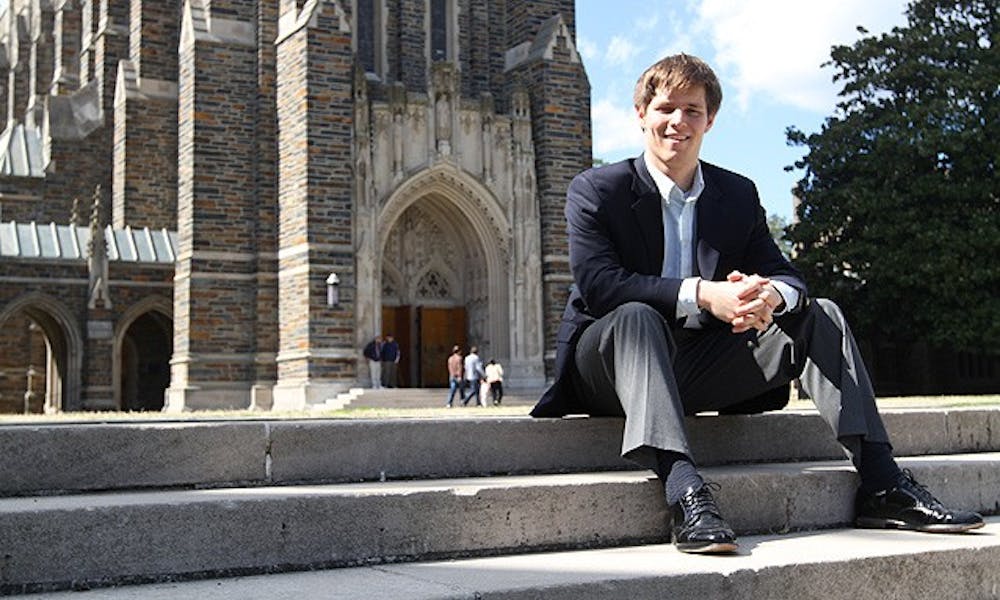Junior Pete Schork has come a long way as a student advocate since middle school when he worked to fix broken water fountains.
Schork, who served as Duke Student Government executive vice president this year, is now running for DSG president with the same student-advocate spirit that shaped his formative years.
“DSG might be the student voice, but we’re never going to be the direct stakeholders for most interests,” Schork said. “My vision is one where students are brought into DSG through ongoing conversations and empowered in ways they haven’t been before.”
In order to reinvigorate student body interest and involvement in DSG, Schork plans to change the way DSG collaborates with student groups. He wants to send senators to group meetings, identify ways in which DSG can be a resource to students and recommend policy changes to the Senate based on student interests.
Schork—who served as vice president for athletics and campus services as a sophomore and a senator for athletics and campus services as a freshman—said DSG should have a partnership with student groups to make tangible changes to campus life. One example he outlined was a potential collaboration between DSG and Blue Devils United to expand gender-neutral housing beyond Central Campus.
“The way you can make incremental changes to campus culture is to bring student stakeholder groups to the table and chart a path for what kind of advantageous paths we can pursue in alliance with one another,” Schork said.
He also plans to improve the way non-DSG affiliated students help create policy. Schork said he aims to create committees chaired by cabinet-level positions that include students, faculty and DSG members to best understand the perspectives of each individual group of people within the student body.
“I hope to create a DSG operating model where we incorporate students,” Schork said. “You can attempt to include students as much as you want, but until you put it into the bylaws, it won’t be powerful.”
As president, Schork plans to focus on the future renovation of the West Union Building and the transition from the quadrangle model to the house model. He would use committees to make sure the relevant student groups involved are incorporated into discussions about these two changes.
West Union should serve as a communal focal point, Schork said, and its renovation should create a better dining culture, adding that he would make sure to include organizations affected by the renovations in the conversation—such as the Center for Lesbian, Gay, Bisexual and Transgender Life and the Mary Lou Williams Center for Black Culture.
In addition, Schork said he would ensure that stakeholders are involved in discussions about the house model transition, which he said is a good opportunity to create social autonomy for independents and women as it will minimize the prioritization of fraternities and selective living groups.
He also noted that as president he would advocate for areas DSG does not traditionally focus on, such as securing performance space for dance and arts groups.
Junior Kaveh Danesh, vice president for academic affairs, worked with Schork on the DSG executive board this year and said Schork has worked hard as executive vice president, exceeding the expectations of what the role is.
“I have... been extremely impressed with Pete’s ability as a motivator,” Danesh wrote in an email. “He is someone who knows exactly what you need to hear, someone who effuses a contagious sense of enthusiasm for his work, someone who will help those around him discover what they have to offer and harness that power.”
DSG President Mike Lefevre, a senior, has also worked closely with Schork the last two years. Lefevre noted that Schork’s “fierce work ethic” since his freshman year has prepared him to take on the role of president, and added that Schork has become a “household name” at Duke.
“What I appreciate about Pete is that he’s been working for students since his first day here,” Lefevre said. “He’s among the hardest workers on DSG. He’s realistic and understands what it actually takes to effect change on campus—that wisdom comes from the fact that he’s been doing this for three years.”
Get The Chronicle straight to your inbox
Signup for our weekly newsletter. Cancel at any time.

